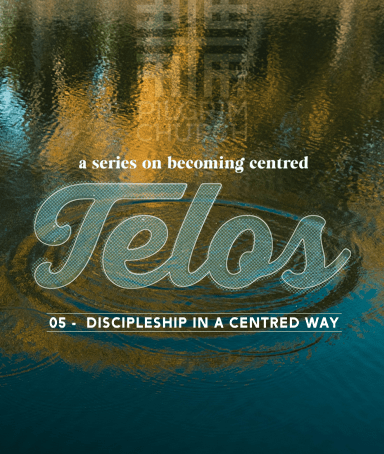TEACHING
|
Your browser does not support viewing this document. Click here to download the document.
|
SUNDAY, JUNE 12, 2022
10:30 AM (in-person + kids + communion) Telos - A Series on Becoming Centred 05 - Discipleship in a Centred Way How we speak and structure our church can keep people from the life changing power of Jesus. Or we can participate in sharing life together and walk this journey holding space for the Holy Spirit to work. One seems like a faster, more “organized” way, but its actual fruit is failure, deconversion, and hypocrisy. The centred way seems plodding, backwards and forwards, sometimes it appears “sin-endorsing,” but the results are more Christ-like people over the long-term.
Apostle Paul: Galatians 6:1 Brothers and sisters, if a person is discovered in some sin, you who are spiritual restore such a person in a spirit of gentleness. Pay close attention to yourselves, so that you are not tempted too.
Jesus: Matthew 18:15 “If your brother* sins, go and show him his fault when the two of you are alone. If he listens to you, you have regained your brother. *tn The Greek term “brother” can mean “fellow believer” or “fellow Christian” (cf. BDAG 18 s.v. ἀδελφός 2.a) whether male or female. It can also refer to siblings, though here it is used in a broader sense to connote familial relationships within the family of God. Therefore, because of the familial connotations, “brother” has been retained in the translation here in preference to the more generic “fellow believer” (“fellow Christian” would be anachronistic in this context). Main Idea: How we speak and structure our church can keep people from the life changing power of Jesus. Or we can participate in sharing life together and walk this journey holding space for the Holy Spirit to work. One seems like a faster, more “organized” way, but its actual fruit is failure, deconversion, and hypocrisy. The centred way seems plodding, backwards and forwards, sometimes it appears “sin-endorsing,” but the results are more Christ-like people over the long-term. Review/Summary In the book CSC, Mark Baker provides several chapters on what this looks like in practice. Section 3 has titles like:
Silence is Violence—Violent Tolerance
When I asked a recent college graduate about his future plans, he spoke of his hopes to work with a Christian organization and focus on issues and change. When I said, “So you are working for transformation, to change people,” he adamantly said “no.” The words transformation or change were fine when applied to paradigms [systems, ideologies], but when applied to individuals, they were radioactive. He would not get close to them (140). Speaking In A Way They Can Hear—Violent, Weaponized ‘Justice’ We need to “lower that resistance by leading people to differentiate between two types of confrontation—bounded, exclusive judgmentalism and centred, loving intervention” (142). If the New Testament’s teaching on confession and accountability seems to us to stand in tension with its strong teaching against judgment, it is only because the New Testament presupposes an understanding of community that is largely absent in the modern church. Without this understanding of community, we don’t have a context to obey in a healthy way the NT’s teaching on the role of the community in transforming us by holding us accountable. When we try to apply this teaching outside the context of community as understood by the early church, it becomes judgment” (218) Repenting of Religion. Disintegrative Shaming vs. Reintegrative Shaming 2 Chronicles 2:5-8 Intervention Practices
Sources: Galatians Commentaries; Center-Set Church: Discipleship and Community without Judgmentalism, Mark D. Baker; Benefit of the Doubt, Repenting of Religion, Gregory A. Boyd |



